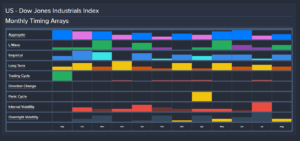The Market Collapse Conspiracy: Separating Fact from Fiction
In recent months, a wave of conspiracy theories has arisen, alleging that former President Donald Trump is intentionally crashing the U.S. stock market to pressure the Federal Reserve into lowering interest rates, which would in turn funnel more money into Treasuries. Alongside these claims, some suggest that Trump is attempting to break the supposed grip of London metal dealers suppressing gold prices, and even spearheading a revaluation of gold to revive a Bretton Woods-like system. These assertions are compelling but merit a thorough examination grounded in evidence rather than speculation.
The Dynamics of Market Forces
To start, let’s consider the complexities of market dynamics. The idea that one individual—be it Trump or anyone else—can orchestrate a market crash is fundamentally flawed. Historical precedents, including the aftermath of the 1987 Crash, tell us that such failures often stem from a confluence of economic factors, not a singular event or actor. The investigations post-1987 found that no singular entity could be blamed for market dynamics; failures are driven by broader economic conditions that often defy governmental manipulation.
At Extreme Investor Network, we emphasize the importance of understanding these macroeconomic forces. In analyzing previous market crashes, it’s evident that factors like inflation rates, governmental fiscal policies, global events, and consumer confidence play far more significant roles. The notion that a market crash could be engineered overlooks these intricate interactions.
The Role of the Fed and Monetary Policy
Critics often claim that if the Fed reduces rates in response to a market downturn, it’s an admission of weakness. Such reactions from the Fed are common during economic downturns and should not be misconstrued as capitulation to conspiracy theories. Historically, the Fed has adjusted rates to maintain economic stability, not to cater to the whims of political figures.
Furthermore, it is essential to understand the broader implications of interest rates. While lower rates can stimulate spending and encourage investment, they also run the risk of exacerbating existing debts, leading us toward a potential sovereign debt crisis. Elon Musk has been quoted emphasizing the unsustainability of current governmental debts, noting that interest expenditures now eclipse defense spending.
The Gold Conundrum
Turning our attention to gold, the theory that Trump aims to ‘break’ the London gold dealers appears overstated. Gold prices are influenced by various geopolitical factors, including inflation fears, currency devaluation, and investor sentiment. It’s simplistic to attribute price movements solely to market manipulation by specific actors. The dynamics around gold pricing are multifaceted and deeply entrenched in global economics.
Is the Bretton Woods System on the Horizon?
As for the idea that Trump or his administration may seek to revert to a Bretton Woods framework, this sentiment feeds into a narrative that undermines our understanding of how modern economies operate. Bretton Woods, with its fixed exchange rate system, has not been viable for decades. In an interconnected, global economy characterized by floating exchange rates, any attempt at rigid monetary systems would invite instability rather than suggest a stable foundation for international trade.
The International Monetary Fund (IMF) and its Special Drawing Rights (SDRs) represent modern attempts to adapt global monetary systems and bolster trade without the historical constraints of gold pegs. While economic advisors like Scott Bessent mention reorganization efforts in monetary systems, they are more likely addressing the need to adapt rather than recreate outdated systems.
The Danger of Conspiracy Theory
Believing in these vast conspiracies detracts from a more nuanced understanding of economics. It can mislead citizens into thinking policy changes are arbitrary, rather than based on sound economic reasoning. This kind of mindset supports a dangerous narrative that feeds into populist demands for simplistic fix-alls instead of comprehensive understanding.
Public discourse should focus on education regarding economic principles rather than subscribing to conspiracy theories that have little grounding in reality. The complexity of trade deficits, international agreements, monetary policy, and historical context matters. We must strive for a society that values informed dialogue over knee-jerk reactions.
Conclusion
At Extreme Investor Network, we are committed to navigating the clouds of misinformation in economic discussions. It is essential to dismantle these oversimplified narratives and turn our focus toward understanding the realistic workings of markets, the role of monetary policy, and the interconnected complexities of the global economy.
By engaging with facts rather than fiction, we can equip ourselves to make informed financial decisions that transcend political rhetoric and conspiracy theories. The journey toward financial literacy is challenging, but it is one that bears significant rewards for all investors.

